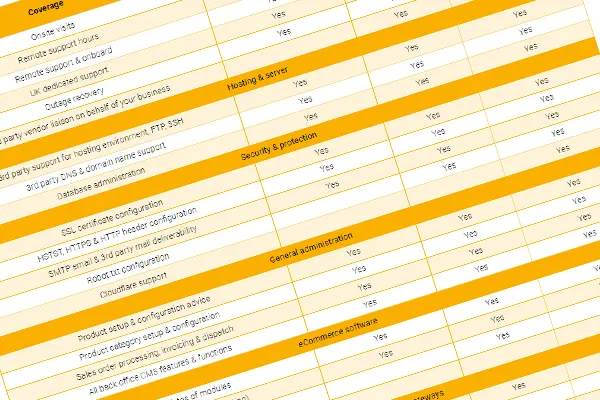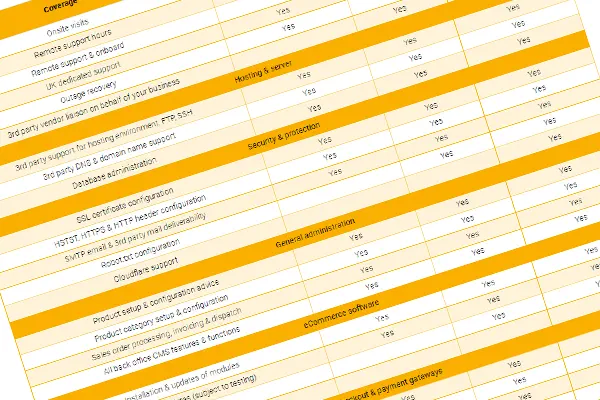Emma Taylor-Lane
15 November 2022
eCommerce
Emma Taylor-Lane
15 November 2022
If you’re in the print, embroidery, schoolwear or workwear industries, chances are that you deal with both B2C and B2B orders. While in theory both types of orders are the same, the truth is that there are probably some differences in how you manage them. So what differences are there between the B2B and B2C markets, and what’s the best way to manage them?
Whether it’s a B2C or B2B order, reliability is key. Both types of clients want high quality products in a timely manner. Failure to deliver can have consequences. In terms of B2B, they will simply go elsewhere in the future. B2C clients are more likely to leave negative reviews on social media or other feedback systems.

There are a number of significant differences between the B2C and B2B orders.
B2B orders are typically larger than B2C orders. B2C orders are more likely to be a few t-shirts for a hen night, or a relatively small number of leaflets or posters for an event. B2B orders may involve dozens of personalised uniforms, multiple business cards, or hundreds of promotional items. This means that the revenue generated by B2B customers will be much greater, although profit margins may be lower.
When an order comes in, whether business or consumer, do you know your stock situation immediately? Can you fulfil it straight away, or do you need to order more items? Without the right systems in place, you will never know.
A B2C order is likely to be a one-off or very occasional, while B2B clients are looking for reliable, ongoing suppliers for all their promotional needs. They want to build a relationship with a company they can trust and will return again and again if they’re happy. An effective CRM system is vital for managing your business relationships.
A B2C order decision is generally made quickly. They may get a few quotes but ultimately will decide within a day or two who they want to purchase from.
B2B ordering decisions typically take longer. They will seek a number of quotations and may even go through a tendering process. Decisions are likely to be taken by a number of people, with those higher up typically having the final say. This means that the purchasing decision can take weeks or even months.
How are you supplying quotations? Are they easily tracked? Or maybe your current systems make it difficult to monitor how successful you are at converting enquiries into orders.
B2C clients will receive standard pricing, with no differentiation. B2B orders are likely to vary in pricing. This may depend on order size, recurring orders, payment terms or the length of working relationship between your company and theirs. You need a system that allows you to differentiate between B2C and B2B pricing, and even personalise pricing for each business.
B2B orders typically need more support. They want regular updates on the status of their order, or may want individual uniforms sent directly to the end user rather than to the company’s offices. They may also want a dedicated point of contact, such as an Account Manager, who can quickly and easily deal with their queries. Whoever is dealing with their queries needs access to a system that allows them access to the latest information on their order at their fingertips.

What systems are you currently using? Are they fully integrated, or are you using siloed programmes that require manual intervention? This allows for human error as well as taking up unnecessary manhours that are costing your business more. It also obscures important data, so that you may not know your exact stock situation, or where in the process your customer’s order is.
Whether your customers are consumer or other businesses, effective systems will ensure satisfied clients. So what systems should you be looking at to improve your customer satisfaction?
An ERP, or Enterprise Resource Planning system, is a way of managing your integrating your entire ordering process from eCommerce on your website, to production, to accounts. It offers a wide range of benefits, that can transform your business into a sleek, efficient machine.
How do your customers currently place their orders? Are they able to do it all online, or do you need to get involved. B2C clients want to be able to place their orders quickly, with minimal fuss, and generally with minimal human interaction. Few people like picking up the phone these days.
Even many businesses are now choosing to shop online. It’s faster and more efficient, especially for smaller companies. They may be too busy during working hours to place an order, and so use your website at a time that suits them. Allowing them to upload logos and text, layout their items and approve their design there and then, removes the need for your staff to get involved, saving time and money.
Stock control is a vital part of your business. You need adequate stock to fulfil orders, but don’t want to overstock and potentially lose money. The right data is key to understanding your stock levels. When do you need to stock summer or winter workwear, for example? Being able to analyse the previous year’s orders allow you to make informed decisions now.
Automation of production
How efficient are your current systems? Do they work seamlessly from order to production to accounts? Or are your staff having to upload designs and manually intervene? Allowing uploaded designs to integrate directly with production systems reduces the time spent transferring data from one system to another. This frees up hundreds of manhours per month, saving money and boosting profits.
Both B2C and B2B clients are looking for great customer service, especially when it comes to B2B. An ERP system integrated with a CRM system allows you to send automated order updates or remind potential customers of abandoned carts, as well as containing important customer information. Communicating regularly with clients is an excellent way to demonstrate strong customer service and keep you at the forefront of their minds.
ERP links your ordering system to your accounts system. This allows for accurate and timely invoicing, with reminders sent automatically should your B2B clients not pay within their agreed terms. Payments can easily be reconciled, and there’s no need for paper invoices, reducing waste and overheads.
Demystify Digital works with a range of ERP systems to manage your business better, as well as providing our own, bespoke SaaS system.
Want to know more about how you can better manage your B2B and B2C order channels? Contact Demystify Digital for a FREE consultation today! Email [email protected], call 01903 372 402 or book it directly using https://outlook.office365.com/owa/calendar/[email protected]/bookings/

Think or can help or need to talk? Book an online Teams meeting today or call 01903 372 402
Contact us details can be found below. If you fancy a chat, please feel free to call.
Demystify Digital Limited is a limited company registered in England and Wales. Registered number: 13844077.
© 2022 Demystify Digital Limited. All rights reserved
| Cookie | Duration | Description |
|---|---|---|
| cookielawinfo-checkbox-analytics | 11 months | This cookie is set by GDPR Cookie Consent plugin. The cookie is used to store the user consent for the cookies in the category "Analytics". |
| cookielawinfo-checkbox-functional | 11 months | The cookie is set by GDPR cookie consent to record the user consent for the cookies in the category "Functional". |
| cookielawinfo-checkbox-necessary | 11 months | This cookie is set by GDPR Cookie Consent plugin. The cookies is used to store the user consent for the cookies in the category "Necessary". |
| cookielawinfo-checkbox-others | 11 months | This cookie is set by GDPR Cookie Consent plugin. The cookie is used to store the user consent for the cookies in the category "Other. |
| cookielawinfo-checkbox-performance | 11 months | This cookie is set by GDPR Cookie Consent plugin. The cookie is used to store the user consent for the cookies in the category "Performance". |
| viewed_cookie_policy | 11 months | The cookie is set by the GDPR Cookie Consent plugin and is used to store whether or not user has consented to the use of cookies. It does not store any personal data. |